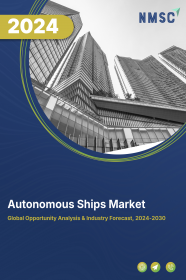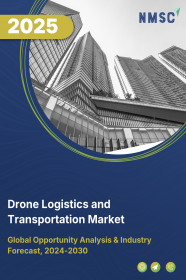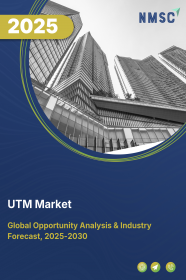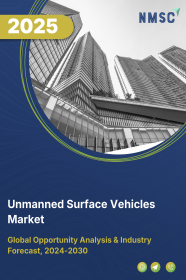
Autonomous Ships Market by Autonomy Level (Semi-Autonomous and Fully-Autonomous), by Ship Type (Commercial, Passenger, and Defense), by Fuel Type (Carbon Neutral Fuels, LNG, Electric Batteries, and Heavy fuel Oil/Marine Engine Fuel), by Component (Software and Hardware) - Global Opportunity Analysis and Industry Forecast, 2020 – 2030
Industry: Aerospace & Defense | Publish Date: 29-Nov-2024 | No of Pages: 332 | No. of Tables: 188 | No. of Figures: 158 | Format: PDF | Report Code : AD342
US Tariff Impact on Autonomous Ships Market
Trump Tariffs Are Reshaping Global Business
Market Definition:
The global Autonomous Ships Market size was valued at USD 6.57 billion in 2019 and is predicted to reach USD 10.74 billion by 2030, with a CAGR of 4.5% from 2020-2030.
Autonomous ships are semi-automatic or fully-automatic crewless ships, technologically designed to operate with minimum or no human intervention. Fully-autonomous ships are equipped with sensors, GPS navigation, propulsion, auxiliary and other required software, as well as hardware systems that assist the ship in operating as per the environmental condition. On the other hand, semi-autonomous ships are partially automated and they require human interference from off board control units.
Benefits offered by autonomous ships such as: decreased labour costs, reduced risk of accidents, cost-effective and reliable functioning, as well as easy operations with higher efficacy; are expected to drive the growth of autonomous ships market, throughout the forecast period.
Market Dynamics and Trends:
The global autonomous ships market is proliferating, owing to the upsurge in international sea-trade, soaring demand for cargo, augmentation in marine tourism, escalation in marine security, and stringent environmental regulations.
Additionally, the growing demand for smart ships, and upsurge in competition among manufactures; further supplements the growth of autonomous ships market.
However, complex nature of technology and increasing incidences of cyber-attacks are projected to hamper the autonomous ships market growth.
Moreover, increasing penetration of AI, IoT and advanced navigation technologies, higher adoption of live tracking and integrated radar systems, as well as growing safety concerns regarding the preservation of marine ecosystems, are the factors anticipated to create several lucrative opportunities in the global autonomous ships market in coming future.
Market Segmentations and Scope of the Study:
The global autonomous ships market share has been analyzed based on autonomy level, fuel type, ship type, component, and geography. Based on autonomy level, the market is segmented into semi-autonomous and fully-autonomous. Based on fuel type, the market is fragmented into carbon neutral fuels, LNG, electric batteries, and heavy fuel oil/marine engine fuel. Based on ship type, the market is classified into commercial, passenger, and defense. Based on component, the autonomous ships market is classified into hardware and software. Geographic breakdown and analysis of each of the previously mentioned segments includes regions comprising North America, Europe, Asia-Pacific, and RoW.
Geographical Analysis:
North America is estimated to account for the major market share in the global autonomous ships market, owing to the increase in overseas trade and cargo. Furthermore, presence of advanced technology, well-established infrastructures, surging marine tourism and high per capita income are the factors anticipated to drive the autonomous ships market growth.
Asia Pacific dominated the global autonomous ships market in the past, but the trend is expected to change during the forecast period. Factors such as growing demand for commercial ships, increasing exports in global trade, presence of harbour in more numbers, as well as evolving emerging economies specifically India and China, are expected in propagating the autonomous ships market growth throughout the forecast period.
Europe is expected to demonstrate a substantial growth in the autonomous ships market, witnessing the highest CAGR values, due to growing demand for cruisers, presence of huge number of ship owners, and conversion of traditional ships into autonomous ships.
Competitive Landscape:
The autonomous ships market is highly competitive and consists of various market players. Some of the major market players include L3 ASV, ABB Ltd., Honeywell International, Marine Technologies LLC, Kongsberg Gruppen, Mitsui O.S.K. Lines, Rolls-Royce, Northrop Grumman, Buffalo Automation, Ulstein Group ASA, Sea Machines Robotics, Inc., Wartsila, Neptec Technologies Corp., Google LLC (Google), Intel Corporation, and Shone Automation Inc. among others.
The key players are employing strategies such as product launches, acquisition, and technical collaboration, in-order to gain stronger position in the global autonomous ships market.
For instance, in September 2019, L3Harris Technologies, one of the key players in autonomous ships market announced the launch of its brand-new class of Autonomous Surface Vehicle (ASV) equipped with advanced capabilities, aimed at assisting United Kingdom’s Royal Navy to comprehend the maintenance of technical advantage over potential adversaries.
In December 2019, Sea Machines Robotics, Inc., one of the leading companies in autonomous ships market, collaborated with HamiltonJet to reinforce its autonomous-control and jet propulsion systems. The amalgamation of jet systems and sea machines for commercial vessels enables the owner to enhance the operational capabilities, precise station-keeping, increased maneuverability, and allows even emergency stops.
In January 2020, Kongsberg Gruppen., one of the major players in autonomous ships market, announced that it had received a 20.1 million Euro investment from Horizon 2020, an EU research program for its Norwegian autonomous-ship project named ‘AUTOSHIP,’ with an objective to install, monitor, and test two vessels in different operational environments. AUTOSHIP is a four-year Horizon 2020 project, set to be fulfilled by the collaboration of major giants viz. KONGSBERG and SINTEF, along with the participation of several European partners and under the support of the Research Council Organization of Norway.
Key Benefits
-
The autonomous ships market report provides the quantitative analysis of the current market and estimations through 2020-2030 that assists in identifying the prevailing market opportunities to capitalize on.
-
The study comprises a deep dive analysis of the autonomous ships market trend including the current and future trends for depicting the prevalent investment pockets in the market.
-
The report provides detailed information related to key drivers, restraints, opportunities, and their impact on the autonomous ships market.
-
The report incorporates competitive analysis of the market players along with their market share in the global autonomous ships market.
-
The SWOT analysis and Porters Five Forces model is elaborated in the study of autonomous ships market.
-
Value chain analysis in the autonomous ships market study provides a clear picture of the stakeholders’ roles.
Key Market Segments
By Autonomy Level
-
Semi-Autonomous
-
Fully-Autonomous
By Ship Type
-
Commercial
-
Passenger
-
Defense
By Fuel Type
-
Carbon Neutral Fuels
-
LNG
-
Electric Batteries
-
Heavy fuel Oil/Marine Engine Fuel
By Component
-
Hardware
-
Software
By Geography
-
North America
-
U.S.
-
Canada
-
Mexico
-
-
Europe
-
UK
-
Germany
-
France
-
Italy
-
Rest of Europe
-
-
Asia-Pacific
-
China
-
India
-
Japan
-
Australia
-
Rest of Asia-Pacific
-
-
RoW
-
UAE
-
Saudi Arabia
-
South Africa
-
Brazil
-
Remaining Countries
-
Key Players
-
L3 ASV
-
ABB Ltd.
-
Honeywell International
-
Marine Technologies LLC
-
Kongsberg Gruppen
-
Mitsui O.S.K. Lines
-
Rolls-Royce
-
Northrop Grumman
-
Buffalo Automation
-
Ulstein Group ASA
-
Sea Machines Robotics, Inc.
-
Wartsila
-
Neptec Technologies
REPORT SCOPE AND SEGMENTATION:
|
Parameters |
Details |
|
Analysis Period |
2019–2030 |
|
Base Year Considered |
2020 |
|
Forecast Period |
2020–2030 |
|
Market Size Estimation |
Billion (USD) |
|
Market Segmentation |
By Autonomy Level (Semi-Autonomous and Fully-Autonomous), by Ship Type (Commercial, Passenger, and Defense), by Fuel Type (Carbon Neutral Fuels, LNG, Electric Batteries, and Heavy fuel Oil/Marine Engine Fuel), by Component (Software and Hardware) |
|
Geographical Segmentation |
North America (U.S., Canada, Mexico), Europe (UK, Germany, Denmark, Greece, Norway, Rest of Europe), Asia-Pacific (China, Japan, Singapore, Australia, South Korea, Rest of APAC), Rest of the World (Latin America, Middle East, Africa) |
|
Companies Profiled |
L3 ASV, ABB Ltd., Honeywell International, Marine Technologies LLC, Kongsberg Gruppen, Mitsui O.S.K. Lines, Rolls-Royce, Northrop Grumman, Buffalo Automation, Ulstein Group ASA, Sea Machines Robotics, Inc., Wartsila, Neptec Technologies Corp., Google LLC (Google), Intel Corporation, and Shone Automation Inc. |

















 Speak to Our Analyst
Speak to Our Analyst

















